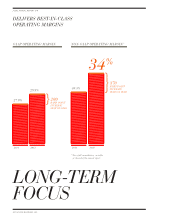Activision 2012 Annual Report Download - page 15
Download and view the complete annual report
Please find page 15 of the 2012 Activision annual report below. You can navigate through the pages in the report by either clicking on the pages listed below, or by using the keyword search tool below to find specific information within the annual report.
they will be lumpy when they reach you.” Our results in 2013
will be “lumpy” by comparison to 2012.
Our 2013 performance will also likely be affected by the fact
that it is a transitional year for the interactive entertainment
industry.
Nintendo launched the Wii U in 2012 to a slower-than-
expected start, and Sony announced the PlayStation 4 in early
2013 with a plan to ship by the end of 2013.
The launch of the next-generation console systems presents
opportunities, but will also create challenging market
conditions. The last transition was disruptive and volatile; it
introduced new competitors and business models that
required time for our company to understand and sort
through the attendant risks and opportunities.
In 2012, we benefitted from a very large current-generation
installed base. In 2013, there will likely be a relatively small
number of new next-generation console video game systems
sold. In addition to the challenges of straddling this transition,
we face challenges related to the continued success of mobile
devices, including tablets. The business models for interactive
entertainment on these devices are much less certain than the
proven ways we generate returns from our online subscription
services, downloadable content for consoles and PCs, and
retail console and PC games.
So far, most companies making small screen games have
generally experienced “big screen”-sized losses. Very few mobile
and tablet games have generated the types of shareholder
returns we have become accustomed to even though the
overall market growth for mobile games has been very strong.
While we are working on initiatives for these promising new
opportunities, there is nothing likely to contribute meaningfully
to our financial results in 2013.
We are optimistic that our leadership position, along with
our resources, scale, infrastructure, and creative talent, should
allow us to take advantage of the positive long-term business
fundamentals that we expect this new era will ultimately
bring. Past console transitions ultimately have expanded our
business opportunities over the long term. They have done
this both by expanding the addressable consumer base (each
console cycle has achieved a bigger installed base than the last),
and by enabling us to make more fun, ambitious, innovative,
and compelling games. That said, there is always a higher
degree of uncertainty during periods of console transition,
and our ability to deliver our customary shareholder returns
on devices, like tablets and smartphones, that now compete
with consoles is unproven.
LESSONS LEARNED
Though 2012 was an outstanding year, we did make some
mistakes. One mistake had a large impact on our financial
results. All mistakes were largely the result of not sticking to the
principles that have worked so well for us for over twenty years.
» Our most significant mistake was the launch of our
subscription service, Call of Duty Elite® in late 2011. The
service attracted a large number of subscribers. As we noted
in our letter last year, it was the third most subscribed
Western interactive entertainment
service after Xbox LIVE
and World of Warcraft. However,
our execution fractured our
player community and had a negative impact on our proven,
successful downloadable content (DLC) business model for
Call of Duty®. As a result, we decided we would better
serve our audience by making all elements of the Call of Duty
Elite service free to our entire Call of Duty player community
and move to a season pass/à la carte model for DLC. We
launched our first DLC for Call of Duty: Black Ops II in late
January of this year. Early results suggest we have satisfied
audiences with our content and this new service model.
ACTIVISION BLIZZARD, INC.
/ 2012 ANNUAL REPORT / 13
























